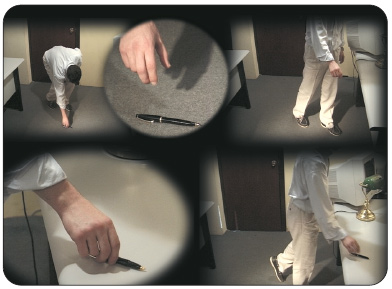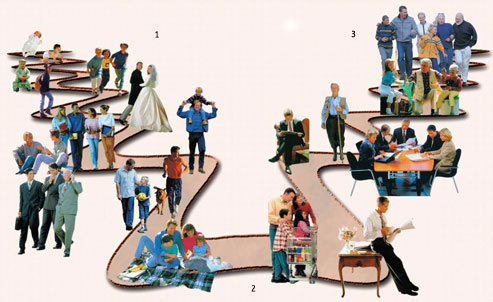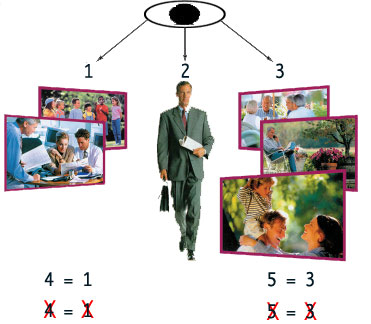Time is a Perception Too
At this point in the book it has been explained that we can never reach the original matter, thought to be an absolute existent, and that every person experiences merely copy images in his brain. And it has been shown how important this reality has been for the increase of fear and love toward God, the spread of spirituality and good morals and the collapse of materialism.
There is another concept similar to matter that materialists have considered eternal and absolute—time. But like matter, time is also a perception and is not eternal; there is a moment when it was created. This fact, which has now been established by scientific proofs, was revealed in several verses of the Qur'an.
Time is A Concept That is Formed From The Comparison of One Moment With Another
 We think that a lapse of time has occurred between the moment the telephone rings and when we hear the voice of a friend, and we call this interval "time". Time is a perception that arises from making a comparison between what we experience at one particular moment and the past. |  Time is a concept that depends on comparing events we have experienced. For example, someone goes into a room. Later he sees a pen on the floor and bends over to pick it up. Then, he takes the pen to a table and places it there. The person makes a comparison between all these actions. He thinks that a space of time has passed between each one and so the perception of time comes to be. | ||
Time is a concept that depends totally on our perceptions and the comparison we make between our perceptions. For example, at this moment you are reading this book. Suppose that, before reading this book, you were eating something in the kitchen. You think that there is a period between the time when you were eating in the kitchen and this moment, and you call it "time". In fact, the moment you were eating in the kitchen is a piece of information in your memory, and you compare this moment with the information in your memory and call it time. If you do not make this comparison, the concept of time disappears and the only moment that exists for you will be the present moment.
 A person's past is composed of information given to her memory. If a person's memory is erased, her past is also erased. The future is composed of ideas. Without these ideas, only the "present moment" of experience remains. | ||
For example, a high school graduation ceremony is something in a person's memory. By comparing other pieces of information in his memory since the graduation, with the present moment, he forms an idea of time and, according to the information in his memory, he determines the length or the shortness of this time. But this sense of length or shortness is completely in his brain, and comes from this comparison.
In the same way, when someone sees a person bend over to pick up a pen that he had dropped on the floor and put it on the table, he makes a comparison. In the moment when the observer saw the person put the pen on the table, that person's bending over, picking up the pen, walking to the table are pieces of information in the observer's brain. The perception of time arises from the comparison of the person putting the pen on the table with these pieces of information.
Renowned physicist Julian Barbour defines time in this way:
Time is nothing but a measure of the changing positions of objects. A pendulum swings, the hands on a clock advance.39
In short, time is composed of a few pieces of information hidden as a memory in the brain; rather, it arises from the comparison of images. If a person did not have a memory, that person would live only in the present moment; his brain would not be able to make these interpretations and, therefore, he would not have any perception of time.
The Views of Scientists On The Idea That Time is A Perception
Today it has been scientifically accepted that time is a concept that arises from our making a definite sequential arrangement among movements and changes. We will try to make this clearer by giving examples from those thinkers and scientists who have established this view.
The physicist Julian Barbour caused a great stir in the scientific world with his book entitled The End of Time in which he examined the ideas of timelessness and eternity. He pointed out that the idea that time was a perception was very difficult for many people to accept. In an interview with Barbour reported in Discover magazine, these comments are made about time being a perception:
"I still have trouble accepting it" he (Barbour) says. But then, common sense has never been a reliable guide to understanding the universe – physicists have been confounding our perceptions since Copernicus first suggested that the sun does not revolve around Earth. After all, we don't feel the slightest movement as the spinning Earth hurtles through the void at some 67,000 miles per hour. Our sense of the passage of time, Barbour argues, is just as wrongheaded as the credo of the Flat Earth Society.40
As we can see above, this renowned physicist pointed out that any idea we have of time being absolute is false, and that research done in modern physics has confirmed this. Time is not absolute; it is a variously perceived, subjective concept depending on events.

 | In a World Where Time Flew Backwards, Past Would Be Future Because every event is shown to us in a definite series, we think that time always moves forward. For example, a skier always skies down a mountain, not up it. A drop of water does not rise up from a pool, but always falls down into it. In this situation, a skier's position on a mountain is in the past, while his position down the mountain is the future. However, if the information in our memories were to be displayed in reverse, as we would rewind a film, what is for us the future, that is the downhill position, would be the past and the past, that is the uphill position, would be the future. | ||
François Jacob, thinker, Nobel laureate and famous professor of genetics, in his book entitled Le Jeu des Possibles (The Possible and the Actual) says this about the possibility that time can move backwards:
Films played backwards make it possible for us to imagine a world in which time flows backwards. A world in which milk separates itself from the coffee and jumps out of the cup to reach the milk-pan; a world in which light rays are emitted from the walls to be collected in a trap (gravity center) instead of gushing out from a light source; a world in which a stone slopes to the palm of a man by the astonishing cooperation of innumerable drops of water which enable the stone to jump out of water. Yet, in such a world in which time has such opposite features, the processes of our brain and the way our memory compiles information, would similarly be functioning backwards. The same is true for the past and future and the world will appear to us exactly as it currently appears.41
Because our brain works by arranging things in a sequence, we do not believe that the world works as described above; we think that time always moves forward. However, this is a decision our brain makes and is therefore totally relative. If the information in our brains were arranged like a film being projected backwards, time would be for us like a film being projected backwards. In this situation, we would start to perceive that the past was the future and the future was the past and we would experience life in a way totally opposite than we do now.
In fact, we cannot know how time moves or, indeed, if it moves at all. This demonstrates that time is not an absolute reality but only a kind of perception.
The fact that time is a perception was proved by the greatest physicist of the 20th century, Albert Einstein, in his "General Theory of Relativity". In his book, The Universe and Dr. Einstein, Lincoln Barnett says this:
Along with absolute space, Einstein discarded the concept of absolute time – of a steady, unvarying inexorable universal time flow, streaming from the infinite past to the infinite future. Much of the obscurity that has surrounded the Theory of Relativity stems from man's reluctance to recognize that sense of time, like sense of colour, is a form of perception. Just as space is simply a possible order of material objects, so time is simply a possible order of events. The subjectivity of time is best explained in Einstein's own words. "The experiences of an individual" he says, "appear to us arranged in a series of events; in this series the single events which we remember appear to be ordered according to the criterion of 'earlier' and 'later'. There exists, therefore, for the individual, an I-time, or subjective time. This in itself is not measurable. I can, indeed, associate numbers with the events, in such a way that a greater number is associated with the later event than with an earlier one.42
From these words of Einstein, we can understand that the idea that time moves forward is totally a conditioned response.
Einstein himself pointed out, as quoted in Barnett's book: "Space and time are forms of intuition, which can no more be divorced from consciousness than can our concepts of colour, shape, or size."43
According to the "General Theory of Relativity", time is not absolute; apart from the series of events according to which we measure it, it has no independent existence.
Our dreams are very important in understanding the relativity of time. In our sleep we experience events that we believe go on for days but actually, we are having a dream which lasts for only a few minutes or even a few seconds.
In order to make this clearer, let us think of an example. Let us think of a specially designed room with one window and that we spend a certain amount of time in it. In the room there is a clock by which we will be able to see the passage of time. Through the window we can see the sun coming up and going down at regular intervals. After a few days we are asked how long we have stayed in the room. Our answer will be calculated by information we have received based on looking at the clock from time to time and on how many times the sun rose and set. For example, we calculate that we have spent three days in the room. But if the person who put us in the room comes and says that we were actually in the room for two days, that the sun we saw in the window was actually artificially produced, and that the clock in the room was fast, then our calculations would make no sense.
This example shows that our knowledge about the rate at which time passes depends on references which change according to the person who is perceiving it.
This is an example of how under different circumstances a person perceives the same amount of time as longer or shorter. Here is another example. For a person who is waiting for his brother to come out of an operation, one hour seems like several. But if the same person is doing something he really enjoys, he cannot understand how the hour passed so quickly.
 |  One twin sister takes a space trip at a speed close to the speed of light. When she returns thirty years later, the sister who stayed on the earth will be much older compared to the sister who went into space. 1. 30 years ego | ||
Einstein scientifically established the following fact in his "General Theory of Relativity": The rate at which time passes changes according to the speed of a body and its distance from the center of gravity. If the speed increases, time decreases, contracts, moves slower and seems that the point of inertia approaches.
Let us explain this with one of Einstein's thought experiments. Suppose that there are two twin brothers. One of them stays in this world, the other goes on a space journey during which he travels almost at the speed of light. When he returns from space, he will find that his twin brother is much older than he is . The reason for this is that the time passed much more slowly for the brother who went on the space trip. The same example can be thought of in relation to a father who went on a space trip in a rocket traveling at nearly 99 percent of the speed of time and his son who remained on this earth. According to Einstein, if the father was 27 years old and his son was three, 30 earth-years later when the father returned to earth, the son would be 33 and the father would be 30 years old. 44
The relativity of time is not something that is relative to the speeding up or slowing down of the clock; it comes from the fact that every material system, to the particles at the subatomic level, works at different rates of speed. In an environment where time was slowed down, a person's heartbeat, rate of cell division and brain activity would happen more slowly. In this situation, a person would go about his daily business unaware that time had slowed down.
The Concept of The Relativity of Time is Revealed in The Koran
As we explained in previous pages, time is not an absolute reality; with discoveries in modern science it has been definitely proved that it is a relative perception. It is a wonder that this discovery made by science in tshe 20th century was revealed in the Koran 1400 years before.
For example, in some verses, it is pointed out that life is very short. A human life of approximately 60 years is said to be as short as an hour in a day.
On the Day He calls you, you will respond by praising Him and think that you have only tarried a very short time. (Surat al-Isra': 52)
On the day We gather them together-when it will seem if they had tarried no more than an hour of a single day - they will recognize one another... (Surah Yunus: 45)
In other verses, it is revealed that time is much shorter than people think it is .
He will say, "How many years did you tarry on the earth?" They will say, "We tarried there for a day or part of a day. Ask those able to count!" He will say, "You only tarried there for a little while if you did but know!" (Surat al-Muminun: 112-114)
In other verses in the Koran it is said that time moves with a different speed in different dimensions. For example, it is revealed that one day in God's sight is equal to a thousand years. (Surat al-Hajj: 47) Other verses speak of this:
The angels and the Spirit ascend to Him in a day whose length is fifty thousand years. (Surat al-Ma'arij: 4)
He directs the whole affair from heaven to earth. Then it will again ascend to Him on a Day whose length is a thousand years by the way you measure. (Surat as-Sajda: 5)
In the style used in many verses of the Koran, it is clearly shown that time is a perception. For example, God speaks of a number of believers (The Companions of the Cave) whom He put into a deep sleep for over 300 years. Later, when He woke them up, these people thought that they had been asleep for a very short time; they could not imagine how long they had been asleep:
So We sealed their ears with sleep in the cave for a number of years. Then We woke them up again so that we might see which of the two groups would better calculate the time they had stayed there. (Surat al-Kahf: 11-12)
That was the situation when we woke them up so they could question one another. One of them asked, "How long have you been here?" They replied, "We have been here for a day or part of a day." They said, "Your Lord knows best how long you have been here..." (Surat al-Kahf: 19)
The situation referred to in the verse below is an important proof that time is a psychological perception:
Or the one who passed by a town which had fallen into ruin? He asked, "How can God restore this to life when it has died?" God caused him to die a hundred years then brought him back to life. Then He asked, "How long have you been here?" He replied, "I have been here a day or part of a day." He said, "Not so! You have been here a hundred years. Look at your food and drink—it has not gone bad—and look at your donkey so We can make you a Sign for all mankind. Look at the bones —how We raise them up and clothe them in flesh." When it had become clear to him, he said, "Now I know that God has power over all things." (Surat al-Baqara: 259)
As we see, it is revealed in these verses that time is relative and not absolute. This means that time changes according to the perceptions of the perceiver; it is not a concrete existent that exists on its own apart from the perceiver.
The Relativity of Time Explains The Reality of Fate
As we see from the account of the relativity of time and the verses that refer to it, time is not a concrete concept, but one that varies depending on perceptions. For example, a space of time conceived by us as millions of years long is one moment in God's sight. A period of 50 thousand years for us is only a day for Gabriel and the angels.
This reality is very important for an understanding of the idea of fate. Fate is the idea that God created every single event, past, present, and future in "a single moment". This means that every event, from the creation of the universe until doomsday, has already occurred and ended in God's sight. A significant number of people cannot grasp the reality of fate. They cannot understand how God can know events that have not yet happened, or how past and future events have already happened in God's sight. From our point of view, things that have not happened are events which have not occurred. This is because we live our lives in relation to the time that God has created, and we could not know anything without the information in our memories. Because we dwell in the testing place of this world, God has not given us memories of the things we call "future" events. Consequently, we cannot know what the future holds. But God is not bound to time or space; it is He who has already created all these things from nothing. For this reason, past, present and future are all the same to God. From His point of view, everything has already occurred; He does not need to wait to see the result of an action. The beginning and the end of an event are both experienced in His sight in a single moment. For example, God already knew what kind of end awaited Pharaoh even before sending Moses to him, even before Moses was born and even before Egypt became a kingdom; and all these events including the end of Pharaoh were experienced in a single moment in the sight of God. Besides, for God there is no such thing as remembering the past; past and future are always present to God; everything exists in the same moment.
Bir insan tüm hayatını bir film şeridi olarak düşünürse, biz bu şeridi video kasetten seyreder gibi seyrederiz ve kasedi ileri almak gibi bir iIf we think of our life as a filmstrip, we watch it as if we were viewing a videocassette with no possibility to speed up the film. But God sees the whole film all at once at the same moment; it is He Who created it and determined all its details. As we are able to see the beginning, middle and end of a ruler all at once, so God encompasses in one moment, from beginning to end, the time to which we are subject. However, human beings experience these events only when the time comes to witness the fate that God has created for them. This is the way it is for the fates of everyone in the world. The lives of everyone who has ever been created and whoever will be created, in this world and the next, are present in the sight of God in all their details. The fates of all living things—planets, plants and things—are written together with the fates of millions of human beings in God's eternal memory. They will remain written without being lost or diminished. The reality of fate is one of the manifestations of God's eternal greatness, power and might. This is why He is called the Preserver (al-Hafiz).
The Concept of "Past" Comes from Information in Our Memories
Because of suggestions we receive, we think we live in separate divisions of time called past, present and future. However, the only reason we have a concept of "past" (as we explained earlier) is that various things have been placed in our memories. For example, the moment we enrolled in primary school is a bit of information in our memory and we perceive it therefore as an event in the past. However, future events are not in our memories. Therefore, we regard these things that we do not yet know about as things that will be experienced or happen in the future. But just as the past has been experienced from our point of view, so has the future. But, because these events have not been given to our memories, we cannot know them.
 | 1. Past | ||
If God puts future events into our memories, then, the future would be the past for us. For example, a thirty yesar old person has thirty years of memories and events in his memory and, for this reason, thinks he has a thirty year past. If future events between the ages of thirty and seventy were to be put into this person's memory, then, for this thirty year old individual, both his thirty years and the "future" between the ages of thirty and seventy, would become the past. In this situation past and future would be present in the memory, and each one would be lived experiences for him.
 | A person's past is actually information located in his memory. If that person's memory were erased, his past would be gone. The future is composed of human thoughts. We make plans for the future and think about it, but if our thoughts were destroyed there would remain no concept of the future. If our memory and our thoughts were taken from us, we would have only the moment of experience, or this particular moment, left. 1. Past | ||
Because God has made us perceive events in a definite series, as if there were a time moving from past to future, He does not inform us of our future or give this information to our memories. The future is not in our memories, but all human pasts and futures are in His eternal memory. This, as we said before, is like observing a human life as if it were already wholly depicted and complete in a film. Someone who cannot advance the film sees his life as the frames pass one by one. He is mistaken in thinking that the frames he has not yet seen constitute the future.
Past and Future Are News of The Unseen
In the verses, God reveals that the only one who knows what is secret, invisible, unseen and unknown is He Himself:
Say: "O God, Originator of the heavens and the earth, Knower of the Unseen and the Visible, You will judge between Your servants regarding what they differed about." (Surat az-Zumar: 46)
Say: "Death, from which you are fleeing, will certainly catch up with you. Then you will be returned to the Knower of the Unseen and the Visible and He will inform you about what you did." (Surat al-Jumu'a: 8)
He said, "Adam, tell them their names." When he had told them their names, He said, "Did I not tell you that I know the Unseen of the heavens and the earth, and I know what you make known and what you hide?" (Surat al-Baqara: 33)
Generally, the word "secret" is thought to refer only to something unknown about the future; however, both the past and the future are secret. Those who have lived in the past and those who will live in the future are kept in God's sight. However, God gives some of the knowledge kept in His sight to the memories of people and makes it known. For example, when God gave knowledge concerning the past in the Koran, He told the Prophet Muhammad (may God bless him and grant him peace) that this was news of the unseen:
That is some of the news of the Unseen which We reveal to you. Neither you nor your people knew it before this time. So be steadfast. The best end result is for those who do their duty. (Surah Hud: 49)
This is news of the Unseen which We reveal to you. You were not with them when they decided what to do and devised their scheme. (Surah Yusuf: 102)
God gave the Prophet Muhammad (may God bless him and grant him peace) information about some things that had not yet happened which was news of the unseen about the future. For example, the taking of Mecca (Surat al-Fath: 27) and the victory of the Greeks over the pagans (Surat ar-Rum: 3-4) were revealed to the Prophet Muhammad (may God bless him and grant him peace) before they happened. The Prophet's (may God bless him and grant him peace) sayings about the signs of the day of resurrection and the end times (which were news of the unseen to people of that time) show that God taught these things to him.
The Koran explains that news of the unseen is given to prophets and some devout believers. For example, it was revealed to Joseph that the trap set for him by his brothers will come to nothing (Surah Yusuf: 15), and to the mother of Moses it was revealed that her son would escape the cruelty of Pharaoh and become a prophet. (Surat al-Qasas: 7)
Finally, all that we call past and future is news of the unseen hidden in the sight of God. God gives some of this knowledge to the memories of those He chooses, at a time He chooses, thus making them aware of some of the unseen. The events which become visible and observable are characterized by human beings as being past events.
The Importance of Submission To Fate
 Just as a person cannot change his past, he also cannot change his future. For this reason, those who are stressed or anxious about things that happen to them experience anxiety and difficulty that result from their not being in submission to their fate. | ||
The fact that past and future are already created in God's sight, and that everything has happened and is present at God's sight, demonstrates a very important truth. Everyone is in complete submission to his fate. Just as a person cannot change his past, so he cannot change his future, because, like the past, the future has already happened. Everything in the future is determined—when and where events will happen, what he will eat, who he will talk to, what he will discuss, how much money he will earn, what diseases he will get, and when, where and how he will die. All these things are already in God's sight and already experienced in His memory. But this knowledge is not yet in a person's memory.
Therefore, those who are sorry, upset, outraged and worried about the future, are anxious in vain. The future they are so worried and anxious about has already happened. And no matter what they do, they cannot change these things.
At this point it is very important to point out that it is necessary to avoid a mistaken understanding of fate. Some people misunderstand and think that what is in their fate will happen anyway so there is nothing they can do. It is true that everything we experience is determined in our fate. Before we experienced an occurrence, it has been experienced in God's sight and is written in all its details in the Mother of the Book (Lawh Mahfuz) in God's sight. But God gives everyone the sense that he can change things and make his own choices and decisions. For example, when a person wants to drink some water, he does not say "If it is my fate I will drink", and sit down without making any move. Instead, he gets up, takes a glass and drinks the water. Actually, he drinks a predetermined amount of water from a predetermined glass. But as he does this, he senses that he is acting according to his own desire and will. He senses this throughout his life in everything that he does. The difference between a person who submits himself to God and to the fate created by God, and someone who cannot grasp this reality is this: the person who submits himself to God knows that everything he does is according to the will of God despite the sense that he has done it himself. The other person mistakenly assumes that he has done everything with his own intelligence and power.
 God Knows and Sees Our Past and Future as One Moment | In this picture the people do not see the car and those in the car do not see them. For this particular moment they are unaware of one another. But someone who looks at this picture from a distance and from a different place will easily see everything on both sides at the same moment. The same thing happens in human life. We have the concepts of the past and the future and, because we are bound to time, we are able to see our future only as time passes. But since God is not bound to time and space, He sees our past, our future and our present in one single moment, with complete vitality and clarity. For example, the sudden stop that this driver will make when he sees the people on the road is known and seen beforehand in the Sight of God. | ||
For example, when a person who has submitted himself to God learns that he has contracted a disease, knows that the disease is in his fate and he trusts in God. He thinks that because God has put it in his fate, it will certainly bring him great good. But he does not wait without taking any measures thinking that if he is fated to get better he will get better. On the contrary, he takes all possible precautions; he goes to a doctor, pays attention to his diet and takes medicine. But he does not forget that the effectiveness of the doctor, the treatment, the medicine, as well as whether or not he will get better are all in his fate. He knows that all this is in God's memory and was present there even before he came into the world. In the Koran, God reveals that everything that human beings experience is written beforehand in a book:
Nothing occurs, either in the earth or in yourselves, without its being in a Book before We make it happen. That is something easy for God. That is so that you will not be grieved about the things that may have escaped you or exult about the things that come to you. God does not love any vain or boastful man. (Surat al-Hadid: 22-23)
For this reason, anyone who believes in fate will not be troubled or despair about things that happen to him. On the contrary, he will have the utmost trust and confidence in his submission to God. God has determined in advance everything that happens to a person; He has commanded that we not be sorry for the things that happen to us, and be self-satisfied by the blessings that we receive. The difficulties that human beings experience, together with their wealth and success, is determined by God. All these things are in the fate predetermined by our Lord to test human beings. As it is revealed in one verse, "... God's command is a pre-ordained decree." (Surat al-Ahzab: 38)
 Every existing thing is created with a fate. Even before a vase is manufactured, it is determined in God's Sight who will make it and in what style, who will buy it and from where, in what house and in what corner it will be placed, and on what day, in what moment and why it will fall and be broken. | ||
In another verse, God reveals that "We have created all things in due measure." (Surat al-Qamar: 49) Not only human beings but also all things animate and inanimate, the sun, the moon, mountains and trees have their fate determined by God. For example, a broken antique vase was broken at the moment determined by its fate. While it was being made, it was determined who would use this centuries-old vase, as well as in which corner of which house and with which other objects it would stand. The designs on the vase and it colors were determined in advance in its fate. It was known in God's memory on which day, which hour, which minute, by whom and how it would be broken. The first moment the vase was made, the first moment it was placed in the window for sale, the first moment it was placed in the corner of the house, the moment it was broken into pieces, in short, every moment in the centuries-long life of this vase, was present in God's sight as one single moment. Whereas even though the person who would break the vase was not aware that he would break it until a moment before it happened, that moment was experienced and known in God's sight. For this reason, God tells human beings not to be sorry for the things that may have escaped them. What have escaped them escaped in accordance with their fate, and they cannot change it. People must learn a lesson from what happens in their fate, see the purpose and benefits that accrue to them from it. They must always incline themselves toward the endless mercy, compassion and justice of our Lord, Who creates their fate, and spares and protects His servants.
Those who lead their lives heedless of this important reality are always anxious and fearful. For example, they are very worried about the future of their children. They are very concerned about questions such as these: What school will they go to? What profession will they follow? Will they have good health? What kind of lives will they lead? However, every moment of a person's life is determined in God's sight, from the time he is a single cell to the time he learns to read and write, from the first answers he gives in a university exam to what company he will work in during his life, what papers he will sign and how many times he will sign them, where and how he will die. All of these things are hidden in the memory of God. For example, at this moment, a person is in the fetal stage, at primary school and at the university. These are all in God's memory as one single moment, along with the moment he celebrates his thirty-fifth birthday, the first day he begins his job, the moment when he sees the angels after he dies, the moment when he is buried, and the moment on the Last Day when he will give an account to God.
Consequently, it is pointless to worry and be fearful about a life whose every moment has been lived, experienced and is still present in the memory of God. No matter how hard a person tries and no matter how anxious he may be, everyone, his children, spouse, friends and relatives will live the life that is present at God's sight.
If this is the case, a person of conscience and intelligence who grasps this reality must submit humbly to God and to the fate He has created. Actually, everyone is already in submission to God, created in subservience to Him. No matter whether he likes it or not, he lives subservient to the fate created for him by God. A person who denies his fate is a denier because being a denier is written in his fate.
Those who submit themselves willingly to God may hope to enjoy God's pleasure and mercy and to win paradise; they will live a life of well being in security and happiness both in this world and in the world to come. This is because, for a person who submits himself to God, knowing that there is nothing better for him than the fate created for him by God, there is nothing to fear or be anxious about. This person will make every effort, but he knows that this effort is in his fate and, no matter what he does, he will not have the ability to change what is written in his fate.
A believer will submit himself to the fate created by God. In the face of what happens to him, he will do his best to understand the purpose of these happenings, take precautions, and make an effort to change things for the better. But he will take comfort in his knowledge that all these things come to be according to fate and that God had determined the most beneficial things in advance. As an example of this, the Koran mentions measures taken by Jacob for the security of his children. In order to make his sons beware of people with evil intentions, Jacob advised his sons to enter the city by different gates but he reminded them that this would never influence the fate determined by God.
He said, "My sons! You must not enter through a single gate. Go in through different gates. But I cannot save you from God at all, for judgment comes from no one but God. In Him I put my trust, and let all those who put their trust, put it in Him alone." (Surah Yusuf: 67)
People may do what they like, but they will never be able to change their fate. This is revealed in this verse:
Then He sent down to you, after the distress, security, restful sleep overtaking a group of you, whereas another group became prey to anxious thoughts, thinking other than the truth about God—thoughts belonging to the Time of Ignorance—saying, "Do we have any say in the affair at all?" Say, "The affair belongs entirely to God." They are concealing things inside themselves which they do not disclose to you, saying, "If we had only had a say in the affair, none of us would have been killed here in this place." Say, "Even if you had been inside your homes, those people for whom killing was decreed would have gone out to their place of death." So that God might test what is in your breasts and purge what is in your hearts. God knows the contents of your hearts. (Surah Al 'Imran: 154)
 Even before a car is manufactured, it is determined in its fate what color it will be, who will buy it and even what it will be like in the junkyard. | ||
It can be seen in this verse that even if a person runs away from a task in the way of God in order not to die, if his death is written in his fate, he will die anyway. Even the ways and methods resorted to in order to escape death are determined in fate and everyone will experience those things that are written in his fate. And in this verse, God reveals to human beings that the purpose of the things created in their fate is to test them and to purify their hearts. In the Koran it is said that everyone's death is determined in the sight of God and that the conception of a baby happens with the permission of God.
God created you from dust and then from a drop of sperm and then made you into pairs. No female becomes pregnant or gives birth except with His knowledge. And no living thing lives long or has its life cut short without that being in a Book. That is easy for God. (Surah Fatir: 11)
In the verses below it is revealed that everything a person does is written sentence by sentence and what those in paradise experience are also things that have already been experienced. As we said earlier, the real life of paradise is for us in the future. But the lives of those in paradise, their conversations and feasting is in God's memory at this moment. Before we were born, the future of humanity in this world and the next had been experienced in God's sight in a moment and is being kept in God's memory.
Everything they did is in the Books. Everything is recorded, big or small. The heedful are amid Gardens and Rivers, on seats of honour in the presence of a Competent Sovereign. (Surat al-Qamar: 52-55)
We can understand from this way of speaking in the Koran that, in God's sight, time is a single moment and for Him there is no past or future. As we see, some events that will be for us in the future, are understood in the Koran as being long passed. This is because both the past and the future are created by God as a single moment. Therefore, an event which is related to occur in the future, in fact, has already occurred, but, because we cannot understand this, we think of them as future. For example, in the verses where the account to be given to God by human beings is described, it is understood as a long passed event.
And the trumpet is blown, and all who are in the heavens and all who are on the earth swoon away, save him whom God wills. Then it is blown a second time, and behold them standing waiting! And the earth shone with the light of her Lord, and the Book is set up, and the prophets and the witnesses are brought, and it is judged between them with truth, and they are not wronged. Every self will be repaid in full for what it did. He knows best what they are doing. Those who disbelieve will be driven to Hell in companies and when they arrive there and its gates are opened its custodians will say to them, "Did messengers from yourselves not come to you, reciting your Lord's signs to you and warning you of the meeting on this Day of yours?" They will say, "Indeed they did, but the decree of punishment is justly carried out against the unbelievers." They will be told, "Enter the gates of Hell and stay there timelessly, for ever. How evil is the abode of the arrogant!" And those who fear [and respect] their Lord will be driven to the Garden in companies and when they arrive there, finding its gates open, its custodians will say to them, "Peace be upon you! You have done well so enter it timelessly, for ever." (Surat az-Zumar: 68-73)
Some further examples of this are the following:
And every soul came, along with a driver and a witness. (Surah Qaf: 21)
And the heaven is cloven asunder, so that on that day it is frail. (Surat al-Haqqa: 16)
And because they were patient and constant, He rewarded them with a garden and garments of silk. Reclining in the garden on raised thrones, they saw there neither the sun's excessive heat nor excessive cold. (Surat al-Insan: 12-13)
And Hell is placed in full view for all to see. (Surat an-Nazi'at: 36)
But on this day the believers laugh at the unbelievers. (Surat al-Mutaffifin: 34)
And the sinful saw the fire and realized they are going to fall into it and find no way of escaping from it. (Surat al-Kahf: 53)
In the above verses, the events we are to experience after death are described as finished. This is because God is not bound to the relative dimension of time and space as we are. God has willed all these events in timelessness; human beings have done them, experienced them all and brought them to a conclusion. The verse below reveals that every kind of occurrence, great and small, happens within the knowledge of God and is inscribed in a book.
You do not engage in any matter or recite any of the Koran or do any action without Our witnessing you while you are occupied with it. Not even the smallest speck eludes your Lord, either on earth or in heaven. Nor is there anything smaller than that, or larger, which is not in a Clear Book. (Surah Yunus: 61)
Footnotes
39- Tim Folger, "From Here to Eternity", Discover, December 2000, p.54
40- Tim Folger, "From Here to Eternity", Discover, December 2000, p.54
41- François Jacob, Le Jeu Des Possibles, University of Washington Press, 1982, p. 111
42- Lincoln Barnett, The Universe and Dr. Einstein, William Sloane Associate, New York, 1948, p. 52-53
43-Lincoln Barnett, The Universe and Dr. Einstein, William Sloane Associate, New York, 1948, p. 17
44- Paul Strathern, The Big Idea:Einstein and Relativity, Arrow Books, 1997, p. 57
- Foreword
- Introduction
- It is a Scientific Fact That We Only Confront a Copy of The World in Our Brains
- Why is The Truth About Matter Such an Important Subject?
- Time is a Perception Too
- Eternity is Hidden in God's Memory
- Replies to Objections Regarding the Reality of Matter
- Conclusion: The Truth Cannot Be Avoided
- Those Who Learn The Truth About Matter Feel Great Excitement
- The Misconception of Evolution
